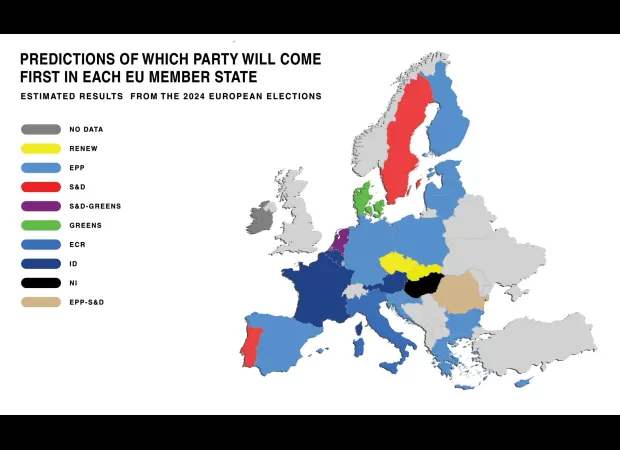A map displays the extent of far-right support in Europe following EU elections.
Extremist parties expected to see significant increase in power throughout Europe.

The results of the EU elections have caused a stir across Europe, especially in France where President Emmanuel Macron has made a shocking decision. In the wake of his party's crushing defeat to the far-right, Macron has dissolved parliament and called for a snap election. This comes after Marine Le Pen's National Rally party won 32% of the vote, more than doubling the results of Macron's centrist, pro-EU Renaissance party.
But France is not the only country to have seen a surge in far-right parties. Germany's AfD has overtaken the ruling Social Democrat party, while Belgium's liberal prime minister, Alexander De Croo, has resigned after his party received just 7% of the vote. Italy, Hungary, and Denmark have also seen a rise in far-right parties, causing concern for the future of Europe.
In a televised address from the Elysee presidential palace, Macron acknowledged the defeat and admitted that the EU election was "no good" for his government. He also expressed his concerns about the rise of nationalist parties and their impact on both France and Europe. Therefore, he has decided to give the people the choice of their parliamentary future through a vote and has dissolved the National Assembly.
Macron emphasized the need for a clear majority in order to act with "serenity and harmony" and promised to address the concerns of the French people. The outcome of the EU elections is expected to have a significant impact on the political landscape of Europe, and here's a roundup of the key results and their implications so far.
Austria's far-right Freedom Party is projected to win the majority of the country's 20 seats in the European Parliament, according to initial exit polls. Austrian Chancellor Karl Nehammer has acknowledged the "message" from voters and has promised to address their concerns, particularly on the issue of illegal migration.
In Belgium, the ruling liberal party suffered a major defeat in the EU, national, and regional elections. The country's EU seats were split between two far-right Flemish parties and a liberal party, which all gained around 13% of the vote. The leader of the Flemish party, N-VA, has called it a victory and is now the frontrunner to become Belgium's next prime minister.
The most shocking result of the night was in France, where Marine Le Pen's National Rally party surged to victory, prompting Macron to call for a snap general election. In his announcement, Macron acknowledged the message from the people and gave them the choice to decide the future of their country.
In Germany, Chancellor Olaf Schulz's coalition government suffered a severe defeat, coming in third place behind the centre-right Christian Democrats and the extreme-right Alternative fur Deutschland. The ruling Social Democrats received less than 14% of the vote, which is considered a disastrous result.
Hungary's far-right Fidesz party, led by Viktor Orban, maintained its grip on Hungarian politics but saw a decline in its performance. The party is still expected to have a majority, with the centre-right Tisza party coming in second. Orban declared victory and affirmed his government's policy course.
Italy's far-right prime minister, Giorgia Meloni, emerged as a top kingmaker in the EU elections. Her party, Brothers of Italy, doubled its seats in the European Parliament, giving them a significant role in shaping the balance of power in the bloc. Meloni thanked her supporters and compared her party's success to a "war situation."
The EU elections have caused a stir in Europe, and the results are expected to have a significant impact on the continent's politics. With the rise of far-right parties, the balance of power in Europe is shifting, and it remains to be seen how this will affect the future of the European Union.
2 Views






